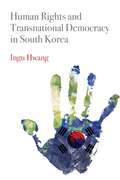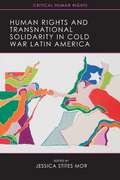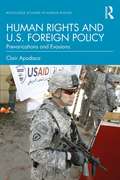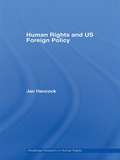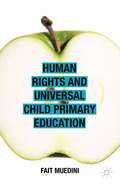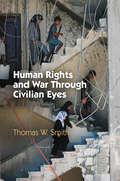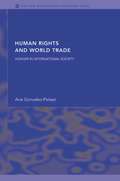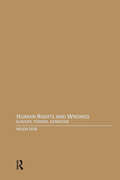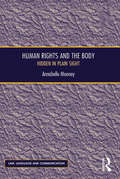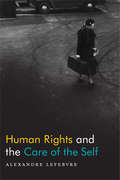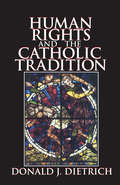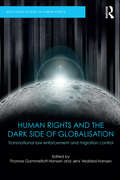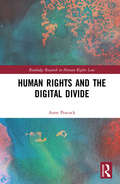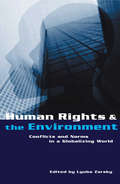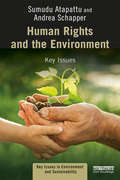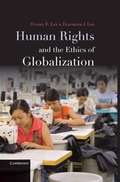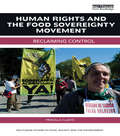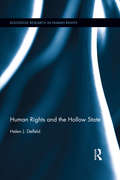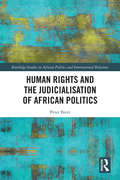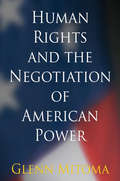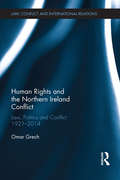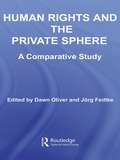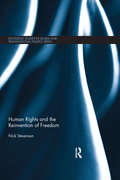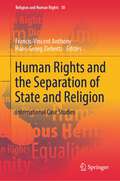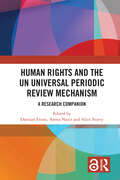- Table View
- List View
Human Rights and Transnational Democracy in South Korea (Pennsylvania Studies in Human Rights)
by Ingu HwangDrawing on previously unused or underutilized archival sources, this book offers the first account of the historical intersection between South Korea's democratic transition and the global human rights boom in the 1970s. It shows how local pro-democracy activists pragmatically engaged with global advocacy groups, especially Amnesty International and the World Council of Churches, to maximize their socioeconomic and political struggles against the backdrop of South Korea's authoritarian industrialization and U.S. hegemony in East Asia. Ingu Hwang details how local prodemocracy protesters were able to translate their sufferings and causes into international human rights claims that highlighted how U.S. Cold War geopolitics impeded democratization in South Korea. In tracing the increasing coalitional ties between local pro-democracy protests and transnational human rights activism, the book also calls attention to the parallel development of counteraction human rights policies by the South Korean regime and US administrations. These counteractions were designed to safeguard the regime's legitimacy and to ensure the US Cold War security consensus. Thus, Hwang argues that local disputes over democratization in South Korea became transnational contestations on human rights through the development of trans-Pacific human rights politics.Human Rights and Transnational Democracy in South Korea critically engages with studies on global human rights, contemporary Korea, and U.S. Cold War policy. By presenting a bottom-up approach to the shaping of global human rights activism, it contributes to a growing body of literature that challenges European/U.S. centric accounts of human rights advocacy and moves beyond the national and mjinjung (people's) framework traditionally used to detail Korea's democratic transition.
Human Rights and Transnational Solidarity in Cold War Latin America
by Jessica Stites MorWith the end of the global Cold War, the struggle for human rights has emerged as one of the most controversial forces of change in Latin America. Many observers seek the foundations of that movement in notions of rights and models of democratic institutions that originated in the global North. Challenging that view, this volume argues that Latin American community organizers, intellectuals, novelists, priests, students, artists, urban pobladores, refugees, migrants, and common people have contributed significantly to new visions of political community and participatory democracy. These local actors built an alternative transnational solidarity from below with significant participation of the socially excluded and activists in the global South. Edited by Jessica Stites Mor, this book offers fine-grained case studies that show how Latin America’s re-emerging Left transformed the struggles against dictatorship and repression of the Cold War into the language of anti-colonialism, socioeconomic rights, and identity.
Human Rights and U.S. Foreign Policy: Prevarications and Evasions (Routledge Studies in Human Rights)
by Clair ApodacaHuman Rights and U.S. Foreign Policy provides a comprehensive historical overview and analysis of the complex and often vexing problem of understanding the formation of U.S. human rights policy. The proper place of human rights and fundamental freedoms in U.S. foreign policy has long been debated among scholars, politicians, and the American public. Clair Apodaca argues that the history of U.S.human rights policy unfolds as a series of prevarications that are the result of presidential preferences, along with the conflict and cooperation among bureaucratic actors. Through a series of chapters devoted to U.S. presidential administrations from Richard Nixon to the present, she delivers a comprehensive historical, social, and cultural context to understand the development and implementation of U.S. human rights policy. For each administration, she pays close attention to how ideology, bureaucratic politics, lobbying, and competition affect the inclusion or exclusion of human rights in the economic and military aid allocation decisions of the United States. She further demonstrates that from the inception of U.S. human rights policy, presidents have attempted to tell only part of the truth or to reformulate the truth by redefining the meaning of the terms "human rights," "democracy," or "torture," for example. In this way, human rights policy has been about prevarication. Human Rights and U.S. Foreign Policy is a key text for students, which will appeal to all readers who will find a historically informed, argument driven account of the erratic evolution of U.S. human rights policy since the Nixon Administration.
Human Rights and US Foreign Policy (Routledge Research in Human Rights #Vol. 1)
by Jan HancockThis book analyzes the role of human rights in the foreign policy of the George W. Bush Administrations. References to human rights, freedom and democracy became prominent explanations for post-9/11 foreign policy, yet human rights have been neither impartially nor universally integrated into decision-making. Jan Hancock addresses this apparent paradox by considering three distinct explanations. The first position holds that human rights form a constitutive foreign policy goal, the second that evident double standards refute the first perspective. This book seeks to progress beyond this familiar discussion by employing a Foucaultian method of discourse analysis to suggest a third explanation. Through this analysis, the author examines how a discourse of human rights has been artificially produced and implemented in the presentation of US foreign policy. This illuminating study builds on a wealth of primary source evidence from human rights organizations to document the contradictions between the claims and practice of human rights made by the Bush Administrations, as well as the political significance of denying this disjuncture. Human Rights and US Foreign Policy will be of interest to advanced students and researchers of US foreign policy, human rights, international relations and security studies.
Human Rights and Universal Child Primary Education
by Fait MuediniThis book examines the progress toward universal child primary education, and the obstacles that remain. Fait Muedini describes the current state of child primary education, the international laws that support the right to free childhood education, and the positive gains that are paving the way to universal free schooling. He also discusses remaining legal and logistical roadblocks still to be overcome by the NGOs and international organizations that strive to deliver free education to allchildren. The benefits to free primary education ripple throughout the world system, and this discussion illuminates the current state of universal education delivery and points the way to next steps.
Human Rights and War Through Civilian Eyes (Pennsylvania Studies in Human Rights)
by Thomas SmithInternational lawyers and ethicists have long judged wars from the perspective of the state and its actions, developing international humanitarian law by asking such questions as "Are the belligerents justified in entering the conflict?" and "How should they conduct themselves during the war's execution?" and "When civilian noncombatants are harmed, who is responsible for their suffering?" <P><P>Human Rights and War Through Civilian Eyes reimagines the ethics of war from the standpoint of its collateral victims, focusing on the effects of war on individuals—on those who are terrorized, or killed, or whose lives are violently disrupted. Upholding a human rights analysis of war, Thomas W. Smith conveys vividly the depth of human loss and the narrowing of everyday life brought about by armed conflict. <P><P>Through riveting case studies of the Iraq War and the recent Gaza conflicts, Smith shows how even combatants who profess to follow the laws of war often engage in appalling violence and brutality, cutting short civilian lives, ruining economies, rending social fabrics, and collapsing public infrastructure. A focus on the human dimension of warfare makes clear the limits of international humanitarian law, and underscores how human rights perspectives increase its efficacy. <P><P> At a moment when liberal states are rethinking the ethics of war as they seek to extricate themselves from unjust or unwise conflicts and taking on the responsibility to intervene to protect vulnerable people from slaughter, Human Rights and War helps us see with bracing clarity the devastating impact of war on innocent people.
Human Rights and World Trade: Hunger in International Society (New International Relations)
by Ana Gonzalez-PelaezA new and incisive analysis of the political viability of human rights, with an in-depth investigation of its largest violation: world hunger. Gonzalez-Pelaez develops John Vincent's theory of basic human rights within the context of the international political economy and demonstrates how the right to food has become an international norm enshrined within international law. She then assesses the international normative and practical dimensions of hunger in connection with international trade and poverty. Using the society of states as the framework of analysis, she explores the potential that the current system has to correct its own anomalies, and examines the measures that can move the hunger agenda forward in order to break through its current stagnation.
Human Rights and Wrongs: Slavery, Terror, Genocide
by Helen FeinHuman Rights and Wrongs explains the persistence of crimes against humanity since the Holocaust-including slavery, terror, and genocide. Using extended country descriptions and analyses, the book goes beyond case studies to explain such gross human rights violations in terms of an integrated theory of life integrity, giving readers vivid illustrations in addition to a theoretical framework. Distinguished author Helen Fein then asks how we can arrest human wrongs and discusses whether democracy is the answer. She shows the positive links among human rights, freedom, and development and draws out policy recommendations from her findings.
Human Rights and the Body: Hidden in Plain Sight (Law, Language and Communication)
by Annabelle MooneyHuman Rights and the Body is a response to the crisis in human rights, to the very real concern that without a secure foundation for the concept of human rights, their very existence is threatened. While there has been consideration of the discourses of human rights and the way in which the body is written upon, research in linguistics has not yet been fully brought to bear on either human rights or the body. Drawing on legal concepts and aspects of the law of human rights, Mooney aims to provide a universally defensible set of human rights and a foundation, or rather a frame, for them. She argues that the proper frames for human rights are firstly the human body, seen as an index reliant on the natural world, secondly the globe and finally, language. These three frames generate rights to food, water, sleep and shelter, environmental protection and a right against dehumanization. This book is essential reading for researchers and graduate students in the fields of human rights and semiotics of law.
Human Rights and the Care of the Self
by Alexandre LefebvreWhen we think of human rights we assume that they are meant to protect people from serious social, legal, and political abuses and to advance global justice. In Human Rights and the Care of the Self Alexandre Lefebvre turns this assumption on its head, showing how the value of human rights also lies in enabling ethical practices of self-transformation. <p><p> Drawing on Foucault's notion of "care of the self," Lefebvre turns to some of the most celebrated authors and activists in the history of human rights–such as Mary Wollstonecraft, Henri Bergson, Eleanor Roosevelt, and Charles Malik–to discover a vision of human rights as a tool for individuals to work on, improve, and transform themselves for their own sake. This new perspective allows us to appreciate a crucial dimension of human rights, one that can help us to care for ourselves in light of pressing social and psychological problems, such as loneliness, fear, hatred, patriarchy, meaninglessness, boredom, and indignity.
Human Rights and the Catholic Tradition
by Donald DietrichFrom the French Revolution to Vatican II, the institutional Catholic Church has opposed much that modernity has offered men and women constructing their societies. This book focuses on the experiences of German Catholics as they have worked to engage their faith with their culture in the midst of the two world wars, the barbarism of the Nazi era, and the uncertainties and conflicts of the post-World War II world.German Catholics have confronted and challenged their Church's anti-modernism, two lost wars, the Weimar Republic, the Nazi Third Reich, the Cold War, German reunification and the impulses of globalization. Catholic theologians and those others nurtured by Catholicism, who resisted Nazism to create their own private spaces, developed a personal and existential theology that bore fruit after 1945. Such theologians as Karl Rahner, Johannes Metz, and Walter Kasper, were rooted in their political experiences and in the renewal movement built by those who attended Vatican II. These theologians were sensitive to the horrors of the Nazi brutalization, the positive contributions of democracy, and the need to create a Catholicism that could join the conversation on human rights following World War II. This dialogue meant accepting non-Catholic religious traditions as authentic expressions of faith, which in turn required that the sacred dignity of every man, woman, and child had to be respected. By the twenty-first century, Catholic theologians had made furthering a human rights agenda part of their tradition, and the German contribution to Catholic theology was crucial to that development. The current Catholic milieu has been forged through its defensive responses to the Enlightenment, through its resistance to ideologies that have supported sanctioned murder, and through an extensive dialogue with its own traditions.In focusing on the German Catholic experience, Dietrich offers a cultural approach to the study of the religious and ethical issues that ground the hum
Human Rights and the Dark Side of Globalisation: Transnational law enforcement and migration control (Routledge Studies in Human Rights)
by Thomas Gammeltoft-Hansen and Jens Vedsted-HansenThis edited volume examines the continued viability of international human rights law in the context of growing transnational law enforcement. With states increasingly making use of global governance modes, core exercises of public authority such as migration control, surveillance, detention and policing, are increasingly conducted extraterritorially, outsourced to foreign governments or delegated to non-state actors. New forms of cooperation raise difficult questions about divided, shared and joint responsibility under international human rights law. At the same time, some governments engage in transnational law enforcement exactly to avoid such responsibilities, creatively seeking to navigate the complex, overlapping and sometimes unclear bodies of international law. As such, this volume argues that this area represents a particular dark side of globalisation, requiring both scholars and practitioners to revisit basic assumptions and legal strategies. The volume will be of great interest to students, scholars and practitioners of international relations, human rights and public international law.
Human Rights and the Digital Divide (Routledge Research in Human Rights Law)
by Anne PeacockThe Internet’s importance for freedom of expression and other rights comes in part from the ability it bestows on users to create and share information, rather than just receive it. Within the context of existing freedom of expression guarantees, this book critically evaluates the goal of bridging the 'digital divide' – the gap between those who have access to the Internet and those who do not. Central to this analysis is the examination of two questions: first, is there a right to access the Internet, and if so, what does that right look like and how far does it extend? Second, if there is a right to access the Internet, is there a legal obligation on States to overcome the digital divide?Through examination of this debate’s history, analysis of case law in the European Court of Human Rights and Inter-American Court of Human Rights, and a case study of one digital inclusion programme in Jalisco, Mexico, this book concludes that there is indeed currently a legal right to Internet access, but one that it is very limited in scope. The 2012 Joint Declaration on Freedom of Expression and the Internet is aspirational in nature, rather than a representative summary of current protections afforded by the international human rights legal framework. This book establishes a critical foundation from which some of these aspirations could be advanced in the future. The digital divide is not just a human rights challenge nor will it be overcome through human rights law alone. Nevertheless, human rights law could and should do more than it has thus far.
Human Rights and the Environment: Conflicts and Norms in a Globalizing World
by Lyuba ZarskyThe impact of environmental damage on human rights - civil, political or welfare and labour rights - is becoming ever-more widely appreciated and has direct bearing on the behaviour of companies and their norms of conduct. In this volume, contributors draw on the tools and insights of a range of disciplines, including law, anthropology, economics, geography and social science, to analyze the issues and show how new standards that protect rights and liberties can be established.
Human Rights and the Environment: Key Issues (Key Issues in Environment and Sustainability)
by Sumudu Atapattu Andrea SchapperThe field of human rights and the environment has grown phenomenally during the last few years and this textbook will be one of the first to encourage students to think critically about how many environmental issues lead to a violation of existing rights. Taking a socio-legal approach, this book will provide a good understanding of both human rights and environmental issues, as well as the limitations of each regime, and will explore the ways in which human rights law and institutions can be used to obtain relief for the victims of environmental degradation or of adverse effects of environmental policies. In addition, it will place an emphasis on climate change and climate policies to highlight the pros and cons of using a human rights framework and to underscore its importance in the context of climate change. As well as identifying emerging issues and areas for further research, each chapter will be rich in pedagogical features, including web links to further research and discussion questions for beyond the classroom. Combining their specialisms in law and politics, Atapattu and Schapper have developed a truly inter-disciplinary resource that will be essential for students of human rights, environmental studies, international law, international relations, politics, and philosophy.
Human Rights and the Ethics of Globalization
by Daniel E. Lee Elizabeth J. LeeHuman Rights and the Ethics of Globalization provides a balanced, thoughtful discussion of the globalization of the economy and the ethical considerations inherent in the many changes it has prompted. The book's introduction maps out the philosophical foundations for constructing an ethic of globalization, taking into account both traditional and contemporary sources. These ideals are applied to four specific test cases: the ethics of investing in China, the case study of the Firestone company's presence in Liberia, free-trade and fair-trade issues pertaining to the coffee trade with Ethiopia, and the use low-wage factories in Mexico to serve the U. S. market. The book concludes with a comprehensive discussion of how to enforce global compliance with basic human rights standards, with particular attention to stopping abuses by multinational corporations through litigation under the Alien Tort Claims Act.
Human Rights and the Food Sovereignty Movement: Reclaiming control (Routledge Studies in Food, Society and the Environment)
by Priscilla ClaeysOur global food system is undergoing rapid change. Since the global food crisis of 2007-2008, a range of new issues have come to public attention, such as land grabbing, food prices volatility, agrofuels and climate change. Peasant social movements are trying to respond to these challenges by organizing from the local to the global to demand food sovereignty. As the transnational agrarian movement La Via Campesina celebrates its 20th anniversary, this book takes stock of the movement’s achievements and reflects on challenges for the future. It provides an in-depth analysis of the movement’s vision and strategies, and shows how it has contributed not only to the emergence of an alternative development paradigm but also of an alternative conception of human rights. The book assesses efforts to achieve the international recognition of new human rights for peasants at the international level, namely the 'right to food sovereignty' and 'peasants’ rights'. It explores why La Via Campesina was successful in mobilizing a human rights discourse in its struggle against neoliberalism, and also the limitations and potential pitfalls of using the human rights framework. The book shows that, to inject subversive potential in their rights-based claims rural social activists developed an alternative conception of rights, that is more plural, less statist, less individualistic, and more multi-cultural than dominant conceptions of human rights. Further, they deployed a combination of institutional (from above) and extrainstitutional (from below) strategies to demand new rights and reinforce grassroots mobilization through rights.
Human Rights and the Hollow State: Human Rights And The Hollow State (Routledge Research in Human Rights)
by Helen J. DelfeldThe book investigates the beliefs about governance that determine that state structures are the most appropriate venue for international human rights actors and activists to operate. Helen Delfeld argues that those beliefs rely on a normative perception of a nation-state, not necessarily applicable to most of the post-colonial world. While most post-colonial states may appear to demonstrate the trappings of modern nation-statehood, these projects are mostly spurred by and benefit an elite class. At the same time, there may be little identification with their government among the grassroots polity. Delfeld focuses on the Philippines as an example of a post-colonial state, using nested case studies to show how people think differently about the state at different scales. Following a two-pronged approach, she investigates key moments of state action or inaction, and then asks people at the grassroots about their perspectives on governance, their engagement with the state, and their views of human rights. Her findings indicate that people at the grassroots rely on alternative forms of governance, often in the form of NGOs, INGOs, local cooperatives, informal networks, or structures that pre-date both colonization and independence. Her research also indicates the possibility that some of the most effective human rights actors do not rely on the state, as demonstrated by comparing locally-generated campaigns aimed at promoting environmental rights with state campaigns that address violence against women. The Hollow State and Human Rights shows that rights initiatives misdirected through a "hollow state" might strengthen the mechanisms of the state, but might not actually create a more attentive nation-state. Human rights activists and actors may be far more effective by accessing local structures directly, the practical implications of which go beyond the Philippines to other post-colonial states.
Human Rights and the Judicialisation of African Politics (Routledge Studies in African Politics and International Relations)
by Peter BrettHuman Rights and the Judicialisation of African Politics shows readers how central questions in African politics have entered courtrooms over the last three decades, and provides the first transnational explanation for this development. The book begins with three conditions that have made judicialisation possible in Africa as a whole; new corporate rights norms (including the expansion of indigenous rights), the proliferation of new avenues for legal proceedings, and the development of new support structures enabling litigation. It then studies the effects of these changes based on fieldwork in three Southern African countries – Zimbabwe, Namibia and Botswana. Examining three recent court cases involving international law, international courts and transnational NGOs, it looks beyond some of international relations’ established models to explain when and why and legal rights can be clarified. This text will be of key interest to scholars and students of African politics and human rights, and more broadly to international relations and international law and justice.
Human Rights and the Negotiation of American Power
by Glenn MitomaThe American attitude toward human rights is deemed inconsistent, even hypocritical: while the United States is characterized (or self-characterized) as a global leader in promoting human rights, the nation has consistently restrained broader interpretations of human rights and held international enforcement mechanisms at arm's length. Human Rights and the Negotiation of American Power examines the causes, consequences, and tensions of America's growth as the leading world power after World War II alongside the flowering of the human rights movement. Through careful archival research, Glenn Mitoma reveals how the U.S. government, key civil society groups, Cold War politics, and specific individuals contributed to America's emergence as an ambivalent yet central player in establishing an international rights ethic.Mitoma focuses on the work of three American civil society organizations: the Commission to Study the Organization of Peace, the National Association for the Advancement of Colored People, and the American Bar Association--and their influence on U.S. human rights policy from the late 1930s through the 1950s. He demonstrates that the burgeoning transnational language of human rights provided two prominent United Nations diplomats and charter members of the Commission on Human Rights--Charles Malik and Carlos Romulo--with fresh and essential opportunities for influencing the position of the United States, most particularly with respect to developing nations. Looking at the critical contributions made by these two men, Mitoma uncovers the unique causes, tensions, and consequences of American exceptionalism.
Human Rights and the Northern Ireland Conflict: Law, Politics and Conflict, 1921-2014 (Law, Conflict and International Relations)
by Omar GrechThis interdisciplinary book explores the Northern Ireland conflict through a human rights framework. The book examines the conflict from the creation of the Northern Ireland state in 1921 to 2014. This timeframe allows an analysis of how human rights impacted upon the conflict in its broadest understanding (i.e. the pre-violent conflict, the violent conflict and the post-violent conflict phases). Furthermore, it allows for a better understanding of how the various stages of the conflict impacted upon how human rights are understood in Northern Ireland today. The study’s main findings are that: (i) human rights had a significant impact on the development of the conflict; (ii) human rights violations were both underlying causes and direct causes of the descent into violence; (iii) the conflict coloured the view of human rights held by the main political actors; and (iv) human rights continue to be partially understood through the prism of the conflict. More generally, this interdisciplinary work explores the relationship between law, politics and conflict. This book will be of much interest to students of human rights, conflict resolution, British politics, law and security studies.
Human Rights and the Private Sphere vol 1: A Comparative Study (UT Austin Studies in Foreign and Transnational Law)
by Jörg Fedtke Dawn OliverParticularly valuable for both academics and practitioners, Human Rights and the Private Sphere: A Comparative Study analyzes the interaction between constitutional rights, freedoms and private law. Focusing primarily on civil and political rights, an international team of constitutional and private law experts have contributed a collection of chapters, each based around a different jurisdiction. They include Denmark, France, Germany, India, Ireland, Israel, Italy, New Zealand, the UK, the US, the European Convention for the Protection of Human Rights and Fundamental Freedoms and the European Union. As well as exploring, chapter by chapter, the key topics and debates in each jurisdiction, a comparative analysis draws the sections together; setting-out the common features and differences in the jurisdictions under review and identifies some common trends in this important area of the law. Cross-references between the various chapters and an appendix containing relevant legislative material and translated quotations from important court decisions makes this volume a valuable tool for those studying and working in the field of international human rights law.
Human Rights and the Reinvention of Freedom (Routledge Studies in Global and Transnational Politics)
by Nick StevensonThis volume seeks to propose a reinvention of freedom under contemporary conditions of globalization, cross-border mobility, and neo-liberal dominance. There are currently two predominant myths circulating about freedom. The first is that in a global age growing numbers of citizens are less concerned with freedom than they are with security. Secondly, there is the presumption that freedom only refers to market freedom and consumerism, implying that the ideas of choice and consumption are interchangeable with ideas of freedom. Stevenson argues that while these arguments are significant, they are deeply misleading. More ‘authentic’ ideas of freedom such as self-realisation, participating in politics and seeking a meaningful life of self-reflection have not been entirely displaced but have instead become reinvented in our global times. The cries of freedom can still be heard in a multitude of places from the Arab Spring to the Occupy Movement and from the protests against European austerity to the current popularity of human rights. Stevenson also argues that the idea of freedom has become increasingly mobile in our interconnected and transnational society. The spaces and places of civil society are more complex in this global age, pushing ideas of freedom far beyond the usual arena of national politics. This volume brings together a diverse range of cultural interpretations in respect of freedom related to the idea of the commons, cosmopolitanism, contemporary documentary cinema and the history of jazz music. Exploring the ways in which notions of freedom are being re-made within the context of the present, and looking more precisely at the current threats to freedom, it will be of interest to students and scholars of globalization, human rights and cultural sociology.
Human Rights and the Separation of State and Religion: International Case Studies (Religion and Human Rights #10)
by Hans-Georg Ziebertz Francis-Vincent AnthonyThis text highlights key aspects of the religion/church-state relationship/debate, and related hitherto marginal topics. The contributions make clear that there is no clear blueprint for an optimal relationship between religion/church and state. Individual states and countries are analysed on the granular level for example, to address mono-religious against poly-religious as well as secular societies. Among others, chapters address education, migration and politics against religion as well as the effect of LGBTQ+ communities on religion and societies. This collected volume appeals to researchers, and students working in religious studies and political science.
Human Rights and the UN Universal Periodic Review Mechanism: A Research Companion
by Alice Storey Damian Etone Amna NazirThe Universal Periodic Review (UPR) is a peer-review mechanism, reviewing all 193 UN Member States’ protection and promotion of human rights. After 10 years of the existence of the UPR mechanisms, this collection examines the effectiveness of the UPR, theoretical and conceptual debates about its modus operandi, and the lessons that can be drawn across different regions/states to identify possible improvements. The book argues that despite its limitations, the UPR mechanism with its inclusive, cooperative and collaborative framework, is an important human rights mechanism with the potential to evolve over time into an effective cooperative tool for monitoring human rights implementation. Divided into three parts, the first focuses on exploring a variety of theoretical approaches to understanding the UPR mechanism. The second part examines specific human rights themes and the relationship between the UPR mechanism and other international mechanisms. Finally, Part III questions implementation and the ways in which states/regional groupings have engaged with the UPR mechanism and what lessons can be learned for the future. The volume will be a valuable resource for researchers, academics and policy-makers working in the area of International Human Rights law, International Organizations and International Relations.
